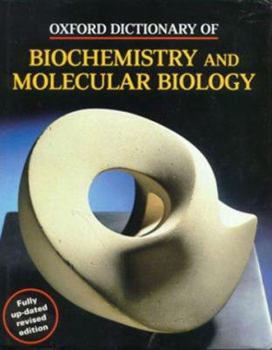Oxford Dictionary of Biochemistry and Molecular Biology
Arranged in A-to-Z order, the more than 17,000 entries provide basic information about fundamental, physiochemical laws, chemical compounds, constants, and formulae. The Dictionary also describes the... This description may be from another edition of this product.
Format:Hardcover
Language:English
ISBN:0198506732
ISBN13:9780198506737
Release Date:February 2000
Publisher:Oxford University Press, USA
Length:672 Pages
Weight:4.25 lbs.
Dimensions:1.6" x 8.2" x 10.3"
Customer Reviews
5 ratings
Complete and mostly accurate
Published by Thriftbooks.com User , 17 years ago
How does one review a dictionary? If the aim is to arrive at a reasoned and mature assessment of the book the ideal way would be to keep it on my shelf for five years or so, noting how often I find it useful to consult it, how often I am happy with the result of the consultation, and how often I am unhappy. Unfortunately, however, the job needs to be done more quickly than that, so I shall adopt a more superficial approach, checking a selection of definitions to see how accurate and helpful they are. Opening the book at random led the definition of "elasticity coefficient". The definition given is accurate enough as far as it goes (setting aside the presence of two undefined quantities in the equation given), but I wonder how much illuminated a reader will be who consults the dictionary in the hope of understanding the (important) difference between an elasticity coefficient and a control coefficient. The definition fails to mention that elasticity coefficients are usually called just elasticities, and it fails to give a cross-reference to "control coefficient" (perhaps just as well, as the dictionary has no entry for control coefficient), but it does give a rather unhelpful suggestion to "see controllability coefficient" --- unhelpful because following the suggestion leads only to the information that this is a "former name for elasticity coefficient". Would it not save the reader trouble just to include this information in the main entry? What about something that I knew nothing at all about before, such as myocilin? This is apparently also called TIGR, which was news to me as I thought TIGR was The Institute for Genome Research, and that is also what the entry for TIGR says, without any cross-reference to myocilin. Anyway, myocilin is a protein of no known function expressed in many tissues---not especially muscle, despite the entry a few lines up that says that myo+ is a prefix denoting muscle. Is this important enough to justify a five-line definition? Apparently it is, because the gene for myocilin is implicated in glaucoma. As an illustration of the maxim that one picture is worth a thousand words, the definition of "Fischer projection" runs to more than 150 words, but lacks the simple diagram that would have rendered the words more readily intelligible. A common fault in elementary biochemistry textbooks is the lack of understanding that some authors display of the ionic states of biochemical species in neutral aqueous solution. This is now far better than it was a generation ago, but there are still some authors who have not yet seen the light. So how well does the dictionary fare? Less well than I would have hoped. Phosphoric acid derivatives are normally shown in ionized states, but carboxylic acids and primary amines do less well: threonine, thyronine, thyroxine, tranexic acid, tryptophan and tyrosine all appear in physically impossible states in the space of a few pages. All this led me to consult the entry on "zwitterion", whic
Excellent reference for the biochemist!
Published by Thriftbooks.com User , 19 years ago
I have been using this book as a general reference since I bought it three years ago. It describes most terms in general biochemistry, molecular biology, organic chemistry and genetics. I find it easier to have one reference book where one can look up terms, than having to search through various textbooks to find the descriptions.
keep handy when you're trawling through science literature
Published by Thriftbooks.com User , 20 years ago
As someone involved in biochemical research, I spend loads of time reading a variety of life science journals. Just keeping up with the latest research is hard enough, but as my areas of interest become ever larger and intermeshed with other disciplines such as medicine and physics, I've found myself delving into this book more and more. But the pace of research is also a problem for a book like this, because to remain useful, new editions cannot appear fast enough to keep up with the latest batch of techniques, genes and proteins. Ultimately an Internet version of this book that gets updated on a regular basis would be the most useful. Never the less, once you get in the habit of using this dictionary, you'll want to keep it nearby when you're browsing the life science literature. Is this book good value? I think it's expensive compared to all other books, but well priced for an academic textbook. I find that using this book is still more rapid and direct than browsing the web for the definition of a word I don't know, and the brief definition given in this book is a good starting point for hunting down more detailed information.
Every Definition you'll need
Published by Thriftbooks.com User , 22 years ago
Great for Science majors, all the definitions or words you used to know but can't remember from class to class. Very thorough. much better than a textbook glossary.
word and definition
Published by Thriftbooks.com User , 25 years ago
i think this book have important words for me and for other student or sciencetist and i think the definition of this book is easy to read for me. finally its not expensive like a other dictionary thank you





